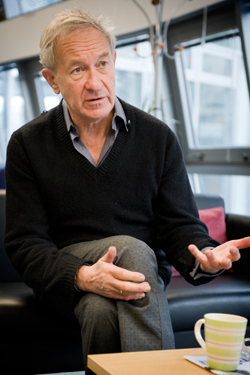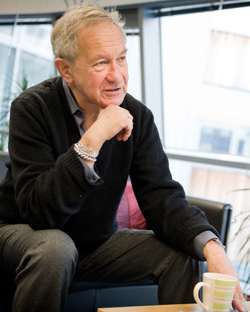Interview with: Simon Schama

The history man prepares for battle
Historian Simon Schama had a blunt message for fellow academics, broadcasters and politicians alike during a visit to the University, as a guest of the Institute for the Public Understanding of the Past, to mark the tenth anniversary of landmark series A History of Britain.
The man who helped to usher in a new age of history on the nation’s television screens was in no mood to pull his punches.
 Broadcaster Simon Schama, who is Professor of Art History
and History at Columbia University, has been called in by the Education
Secretary Michael Gove to advise the Coalition Government on the history
curriculum in schools. But Schama makes no secret of his unease at what lies
ahead for the study of the arts and humanities in UK universities.
Broadcaster Simon Schama, who is Professor of Art History
and History at Columbia University, has been called in by the Education
Secretary Michael Gove to advise the Coalition Government on the history
curriculum in schools. But Schama makes no secret of his unease at what lies
ahead for the study of the arts and humanities in UK universities.
He has deep misgivings about the proposed new financial regimen for higher education. He is uneasy that ‘sciences and subjects which seem to be on a utilitarian measure useful’ have retained their State funding, while the arts and humanities are being stripped of theirs.
He fears that such a move will have the ‘unfortunate’ effect of channelling students into subjects such as accountancy rather than, say, philosophy or history of art.
In York to give a public lecture and speak at an IPUP-organised conference, Schama says that we, in Britain, run the risk of causing ‘appalling’ damage to culture by making the arts and humanities the preserve of the well-heeled.
Simon Schama’s message to the Prime Minister and his Deputy is unequivocal: “It behoves those people who were themselves educated at places like Westminster and Eton - or in my case, Haberdashers’ - to understand the damage that you can do to British culture by making it essentially a wealthy pursuit.”
But it is not only politicians that are in his firing line. He berates academic snobbery among some fellow historians who have worked solely in higher education.
You have to work really hard to make history boring, and there are plenty of people in the institutions who do a brilliant job of making it boring
“You have to work really hard to make history boring, and there are plenty of people in the institutions who do a brilliant job of making it boring,” Schama suggests.
“I was lucky enough to be taught at school and particularly at University by teachers who believed that history was not just for other historians and was not a purely academic pursuit. They really resisted the slightly incestuous model of debates which were hissy fits between rival schools of historians.”
While working with the Prince of Wales Teaching Institute, he recalls talking to ‘stressed-out’ schoolteachers who were ‘heroes doing a brilliant job in difficult circumstances’.
Schama adds, “You have to make sure you understand the social realities of what it’s like to deal with a classroom, for example in inner cities, where a very high proportion of children have English as a second language. Those social realities are very compelling.”
Nevertheless, Schama believes that young people retain a hunger for knowledge about our past, and history remains popular in schools.
 “Children of all ages are wired for ancestral stories and
they are also wired for a kind of critical curiosity. In other words, not just
to be a kind of passive blotting paper for ethics but also to ask questions
about it.”
“Children of all ages are wired for ancestral stories and
they are also wired for a kind of critical curiosity. In other words, not just
to be a kind of passive blotting paper for ethics but also to ask questions
about it.”
Of his early years in broadcasting, Schama recalls that when the idea of A History of Britain was floated, there were those in the BBC who were unconvinced.
“They felt that something on that scale, and particularly in a genre which they thought to be a kind of throwback to Alastair Cooke and Kenneth Clark, wasn’t right for an age dominated by a commitment to gritty observational documentary,” he says.
Happily for him, and us, wiser counsels prevailed, and the series was made, opening up a new era of historical interpretation on television. He stops short of describing the ten years since his seminal series as a ‘golden age’ of history on television, though he concedes it is ‘certainly silver-gilt’.
Schama regards history as ‘part of an ancient civic ground from Herodotus onwards’ in which rigorous archival scholarship goes hand-in-hand with a duty to talk to a broad public.
“I think IPUP is an amazingly brilliant response to legitimising that philosophy,” he concludes.
Further information
